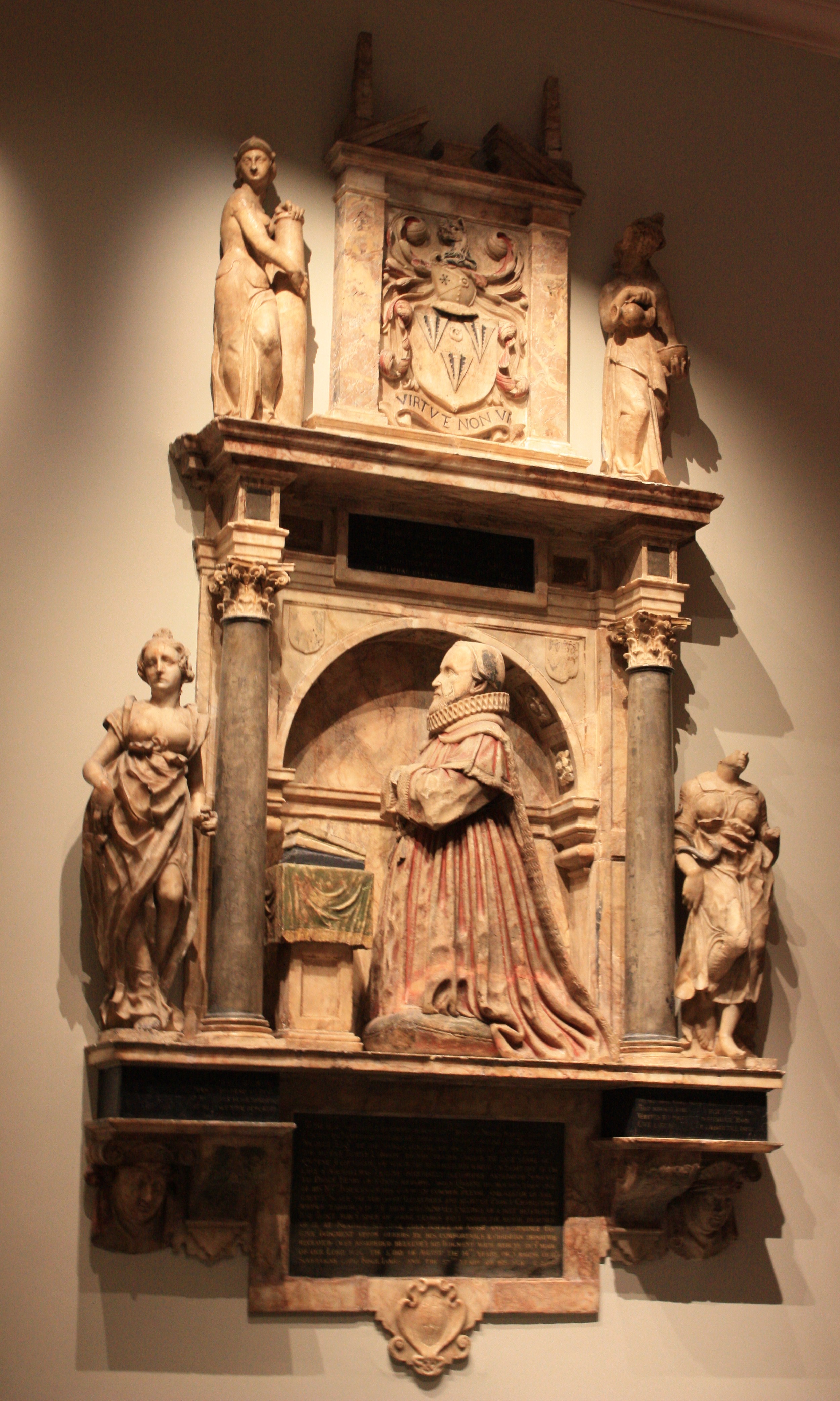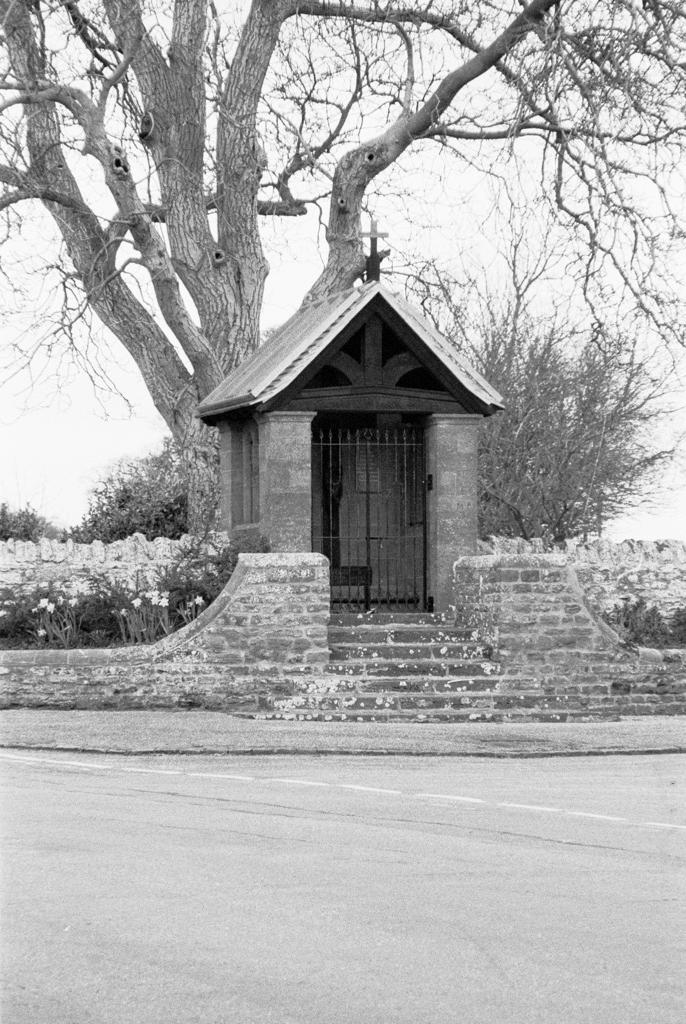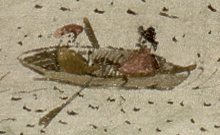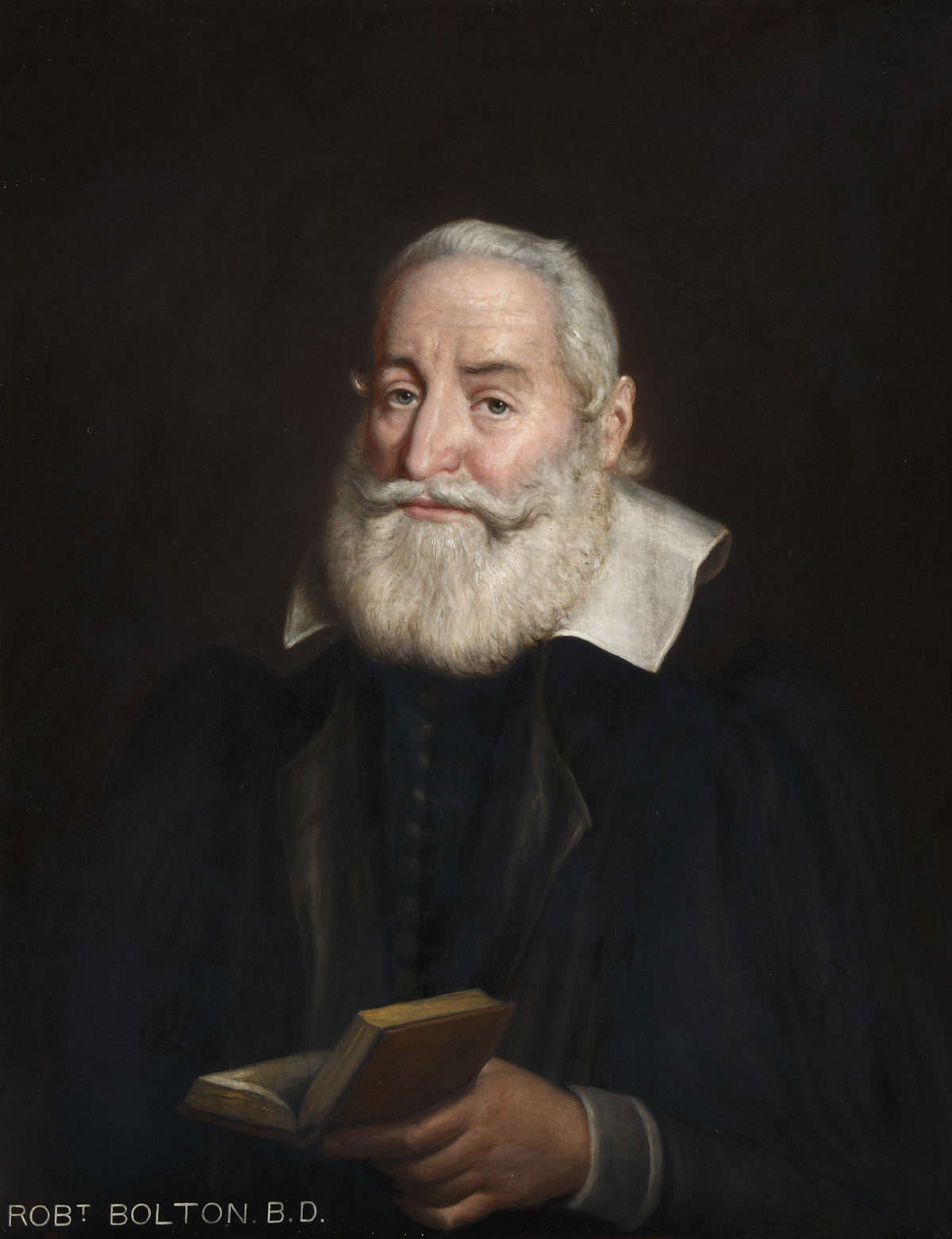|
Augustine Nicolls
Sir Augustine Nicolls or Nicholls (1559–1616) was an English judge. Life Nicolls was born at Ecton, Northamptonshire, in April 1559. He was the second son of Thomas Nicholls, serjeant-at-law, by Anne, daughter of John Pell of Ellington, Huntingdonshire. The Wardour Abbey manor in Ecton had been in the family for three generations, having been purchased by Augustine's grandfather, William Nicolls or Nicoll, of Hardwicke, Northamptonshire, who died in 1575. Nicolls trained in the common law, and became reader at the Middle Temple in the autumn of 1602. On 11 February 1603 Elizabeth I summoned him to become serjeant-at-law by taking the degree of the coif; but she died before the writ was returnable, and it had to be renewed by James I. Nicolls was sworn on 17 May following. On 14 December 1603 Nicolls was made recorder of Leicester. In 1610 Nicolls was attached as serjeant to the household of Henry Frederick, Prince of Wales. On 11 June 1610 he, in addition to the manors of B ... [...More Info...] [...Related Items...] OR: [Wikipedia] [Google] [Baidu] |
Ecton, Northamptonshire
Ecton is a village and civil parish in North Northamptonshire, England. The village is just east of Northampton, just off the A4500 road. It was one of the first villages in Northamptonshire to be given conservation status. The toponym is derived from the Old English words ''Ecca'' and ''tun'', meaning "Ecca's farm/settlement." Demographics The 2011 Census recorded 466 people living in the village: 231 male, 235 female, in 211 households. American links Ecton is a place of pilgrimage for many Americans. Benjamin Franklin's ancestors lived here for over 300 years, many generations of them being the village blacksmiths, on a site where now stands the Three Horseshoes Inn. There are still headstones for members of the Franklin family in the village churchyard; inside the church there is a bronze plaque, provided by a group of American visitors in 1910, which has a quotation from one of Benjamin Franklin’s speeches. Transport Ecton is served by the A4500 which runs east-west pa ... [...More Info...] [...Related Items...] OR: [Wikipedia] [Google] [Baidu] |
Charles I Of England
Charles I (19 November 1600 – 30 January 1649) was King of England, Scotland, and Ireland from 27 March 1625 until Execution of Charles I, his execution in 1649. He was born into the House of Stuart as the second son of King James VI of Scotland, but after his father inherited the English throne in 1603, he moved to England, where he spent much of the rest of his life. He became heir apparent to the kingdoms of England, Scotland, and Ireland in 1612 upon the death of his elder brother, Henry Frederick, Prince of Wales. An unsuccessful and unpopular attempt to marry him to the Spanish Habsburg princess Maria Anna of Spain, Maria Anna culminated in an eight-month visit to Spain in 1623 that demonstrated the futility of the marriage negotiation. Two years later, he married the House of Bourbon, Bourbon princess Henrietta Maria of France. After his 1625 succession, Charles quarrelled with the Parliament of England, English Parliament, which sought to curb his royal prerogati ... [...More Info...] [...Related Items...] OR: [Wikipedia] [Google] [Baidu] |
17th-century English Judges
The 17th century lasted from January 1, 1601 ( MDCI), to December 31, 1700 ( MDCC). It falls into the early modern period of Europe and in that continent (whose impact on the world was increasing) was characterized by the Baroque cultural movement, the latter part of the Spanish Golden Age, the Dutch Golden Age, the French ''Grand Siècle'' dominated by Louis XIV, the Scientific Revolution, the world's first public company and megacorporation known as the Dutch East India Company, and according to some historians, the General Crisis. From the mid-17th century, European politics were increasingly dominated by the Kingdom of France of Louis XIV, where royal power was solidified domestically in the civil war of the Fronde. The semi-feudal territorial French nobility was weakened and subjugated to the power of an absolute monarchy through the reinvention of the Palace of Versailles from a hunting lodge to a gilded prison, in which a greatly expanded royal court could be more easil ... [...More Info...] [...Related Items...] OR: [Wikipedia] [Google] [Baidu] |
English Barristers
English usually refers to: * English language * English people English may also refer to: Peoples, culture, and language * ''English'', an adjective for something of, from, or related to England ** English national identity, an identity and common culture ** English language in England, a variant of the English language spoken in England * English languages (other) * English studies, the study of English language and literature * ''English'', an Amish term for non-Amish, regardless of ethnicity Individuals * English (surname), a list of notable people with the surname ''English'' * People with the given name ** English McConnell (1882–1928), Irish footballer ** English Fisher (1928–2011), American boxing coach ** English Gardner (b. 1992), American track and field sprinter Places United States * English, Indiana, a town * English, Kentucky, an unincorporated community * English, Brazoria County, Texas, an unincorporated community * Engl ... [...More Info...] [...Related Items...] OR: [Wikipedia] [Google] [Baidu] |
1616 Deaths
Events January–June * January ** Six-year-old António Vieira arrives from Portugal, with his parents, in Bahia (present-day Salvador) in Colonial Brazil, where he will become a diplomat, noted author, leading figure of the Church, and protector of Brazilian indigenous peoples, in an age of intolerance. ** Officials in Württemberg charge astronomer Johannes Kepler with practicing "forbidden arts" (witchcraft). His mother had also been so charged and spent 14 months in prison. * January 1 – King James I of England attends the masque ''The Golden Age Restored'', a satire by Ben Jonson on fallen court favorite the Earl of Somerset. The king asks for a repeat performance on January 6. * January 3 – In the court of James I of England, the king's favorite George Villiers becomes Master of the Horse (encouraging development of the thoroughbred horse); on April 24 he receives the Order of the Garter; and on August 27 is created Viscount Villiers and Baron Waddon, receivi ... [...More Info...] [...Related Items...] OR: [Wikipedia] [Google] [Baidu] |
1559 Births
Year 1559 (Roman numerals, MDLIX) was a common year starting on Sunday (link will display the full calendar) of the Julian calendar. Events January–June * January 15 – Coronation of Elizabeth I of England, Elizabeth I of England is crowned, in Westminster Abbey. * February 27 – Queen Elizabeth I of England establishes the Church of England, with the Act of Uniformity 1558 and the Act of Supremacy 1558. The Oath of Supremacy is reinstated. * March 23 – Emperor Gelawdewos of Ethiopia, defending his lands against the invasion of Nur ibn Mujahid, Sultan of Harar, is killed in battle. His brother, Menas of Ethiopia, Menas, succeeds him as king. * April 2–April 3, 3 – Peace of Cateau Cambrésis: France makes peace with England and Spain, ending the Italian War of 1551–59. France gives up most of its gains in Italy (including Savoy), retaining only Saluzzo, but keeps the three Lorraine bishoprics of Metz, Toul, and Verdun, and the formerly E ... [...More Info...] [...Related Items...] OR: [Wikipedia] [Google] [Baidu] |
Tilbury
Tilbury is a port town in the borough of Thurrock, Essex, England. The present town was established as separate settlement in the late 19th century, on land that was mainly part of Chadwell St Mary. It contains a 16th century fort and an ancient cross-river ferry. Tilbury is part of the Port of London with a major deep-water port which contributes to the local economy. Situated 24 miles (38.5 km) east of central London and 23 miles (37 km) southwest of Southend-on-Sea (the nearest city), it is also the southernmost point in Essex. Etymology The name of the present town of Tilbury is derived (by way of the port) from the nearby settlements of East and West Tilbury. The name of these settlements is derived from the Saxon ''burgh'', "fortified place", either belonging to Tila, or perhaps at a lowland place. The 8th century spelling (Bede) was "Tilaburg", and the spelling in Domesday was "Tilberia". History Tilbury's history is closely connected with its geographical location (s ... [...More Info...] [...Related Items...] OR: [Wikipedia] [Google] [Baidu] |
Sir Francis Nicolls, 1st Baronet
Sir Francis Nicolls, 1st Baronet (sometimes spelt Nichols) (1586 – 4 March 1642) was an English Member of Parliament. He was also the first of the Nicolls baronets. He was born the eldest son of Francis Nichols of Hardwick, Northamptonshire and was educated at Brasenose College, Oxford. He also entered the Middle Temple in the same year (1602) to study law but was never called to the bar. He succeeded his father in 1604 and inherited land at Faxton in 1616 on the death of his uncle, the judge Sir Augustine Nicholls. He served as a Justice of the Peace for Northamptonshire in 1620-26 and from 1628 to his death. He was made a commissioner for oyer and terminer on the Midlands circuit in 1626. In 1628 he was elected MP for Northamptonshire, sitting until Parliament was suspended the following year by King Charles I. He was pricked High Sheriff of Northamptonshire for 1630–31. Nicolls was created a baronet on 28 July 1641. He died in 1642. He had married Mary, the daughter o ... [...More Info...] [...Related Items...] OR: [Wikipedia] [Google] [Baidu] |
Robert Bolton
Robert Bolton (1572 – 16 December 1631) was an English clergyman and academic, noted as a preacher. Life He was born on Whit Sunday in Blackburn, Lancashire, the sixth son of Adam Bolton of Backhouse. He attended what is now Queen Elizabeth's Grammar School, Blackburn, where his father was a founding governor, and was described as 'the best scholler in the schoole'. At age 18, he was admitted in 1592 to Lincoln College, Oxford, where John Randall was. He was a gifted student, but the next year his father's death caused him financial problems. Richard Brett supported him. He transferred to Brasenose College where there was a Lancashire fellowship available, and proceeded B.A. there on 2 December 1596; and was chosen in 1602 as a fellow of the college, taking his M.A. on 30 July. He was not particularly religious at this period, and was unimpressed with the preaching of William Perkins; Bolton said he thought Perkins was "a barren empty fellow". On James I's visit to the u ... [...More Info...] [...Related Items...] OR: [Wikipedia] [Google] [Baidu] |
Nicholas Stone
Nicholas Stone (1586/87 – 24 August 1647) was an English sculptor and architect. In 1619 he was appointed master-mason to James I, and in 1626 to Charles I. During his career he was the mason responsible for not only the building of Inigo Jones' Banqueting House, Whitehall, but the execution of elaborate funerary monuments for some of the most prominent of his era that were avant-garde by English standards. As an architect he worked in the Baroque style providing England with some of its earliest examples of the style that was not to find favour in the country for another sixty years, and then only fleetingly. He worked in a context where most sculptors in stone were "mason-sculptors", in modern terms combining sculpture with architecture. The quality of his sculptural work is variable, probably because much of it was done by his workshop colleagues. Netherlandish influence was dominant in English sculpture, and in Stone's training, but the importation of classica ... [...More Info...] [...Related Items...] OR: [Wikipedia] [Google] [Baidu] |
Victoria And Albert Museum
The Victoria and Albert Museum (often abbreviated as the V&A) in London is the world's largest museum of applied arts, decorative arts and design, housing a permanent collection of over 2.27 million objects. It was founded in 1852 and named after Queen Victoria and Prince Albert. The V&A is located in the Royal Borough of Kensington and Chelsea, in an area known as "Albertopolis" because of its association with Prince Albert, the Albert Memorial and the major cultural institutions with which he was associated. These include the Natural History Museum, the Science Museum, the Royal Albert Hall and Imperial College London. The museum is a non-departmental public body sponsored by the Department for Digital, Culture, Media and Sport. As with other national British museums, entrance is free. The V&A covers and 145 galleries. Its collection spans 5,000 years of art, from ancient times to the present day, from the cultures of Europe, North America, Asia and North Africa. Ho ... [...More Info...] [...Related Items...] OR: [Wikipedia] [Google] [Baidu] |
Kendal Parish Church
Kendal Parish Church, also known as the Holy Trinity Church due to its dedication to the Holy Trinity, is the Anglican parish church of Kendal, Cumbria, England. It is recorded in the National Heritage List for England as a designated Grade I listed building. Visitors to the church are struck by its size and the lightness of the interior. This lightness is due to the unusual construction of five aisles, separated by columns and allowing generous window area. The nave is 800 years old and the other aisles have been added over the centuries so that, in its heyday, a congregation of 1100 was regularly accommodated. Anglo-Saxon church A church was built on the site during the Anglo-Saxon period using material "robbed out" from the ruined Roman fort at Watercrook to the south of the town.History , Kendal Parish church site A ... [...More Info...] [...Related Items...] OR: [Wikipedia] [Google] [Baidu] |









